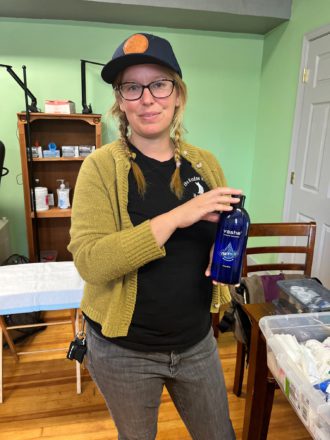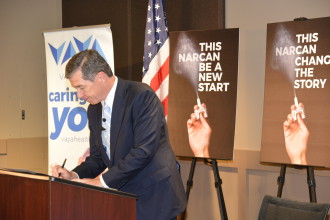Prevention of infections is a crucial part of wound care and decreases the need for antibiotic use. But regularly accessing antibiotics, fulfilling prescriptions and taking medication can present obstacles for many people.


Prevention of infections is a crucial part of wound care and decreases the need for antibiotic use. But regularly accessing antibiotics, fulfilling prescriptions and taking medication can present obstacles for many people.

On Sept. 13, Buncombe County Health & Human Services issued an alert on social media and to local groups like the Homeless Coalition about a spike in overdoses in the county. “Please be advised, over the last several days there has been a continued spike in probable overdoses in Buncombe County,” the email alert from […]

“We’ve tried to arrest our way out of the drug epidemic for decades, and it hasn’t worked,” says Buncombe County Sheriff Quentin Miller. Now, a new program at the Buncombe County Detention Facility is providing medication-assisted treatment to incarcerated people with substance-use disorder. Studies show MAT is an effective treatment for addiction, which can reduce recidivism and lower the risk of overdose.

Over 100 members of the community attended Let’s Talk Opioids, described as a “community update and conversation on opioid crisis response in Buncombe County.” The standing room-only crowd listened as in-the-trenches experts presented information, including the Mountain Area Health Education Center, Vaya Health, Asheville Fire Department, Buncombe County Health and Human Services and the N.C. Department of Justice.

A new play for children, It’s Just a Pill, premiered at A-B Tech’s Ferguson Auditorium on March 8. The 55-minute musical confronts the opioid epidemic from the perspective of a 10-year-old girl. The production will now travel around North Carolina to reach over 4,000 young people.

Harm-reduction efforts and addiction treatment are two of the main strategies public health agencies are using to address the crisis. Buncombe County, Haywood County and the Mountain Area Health Education Center are deploying over $660,000 in federal funds as part of that effort.

The Project CARA program housed at MAHEC Ob/Gyn Specialists came into being to decrease barriers and the stigma that prevents pregnant women with substance-use disorders from getting quality obstetrical care as well as access to substance-use treatment. Last year, Project CARA supported 230 women with substance-use disorders and their families from 16 WNC counties.

Gov. Roy Cooper came to Asheville on Thursday to proclaim September as Drug and Alcohol Recovery Month in the state and to pledge his support for efforts that would effectively increase access to treatment for substance use disorder. “Every day in North Carolina, four people die from opioid overdose,” Cooper said before reading and signing the […]